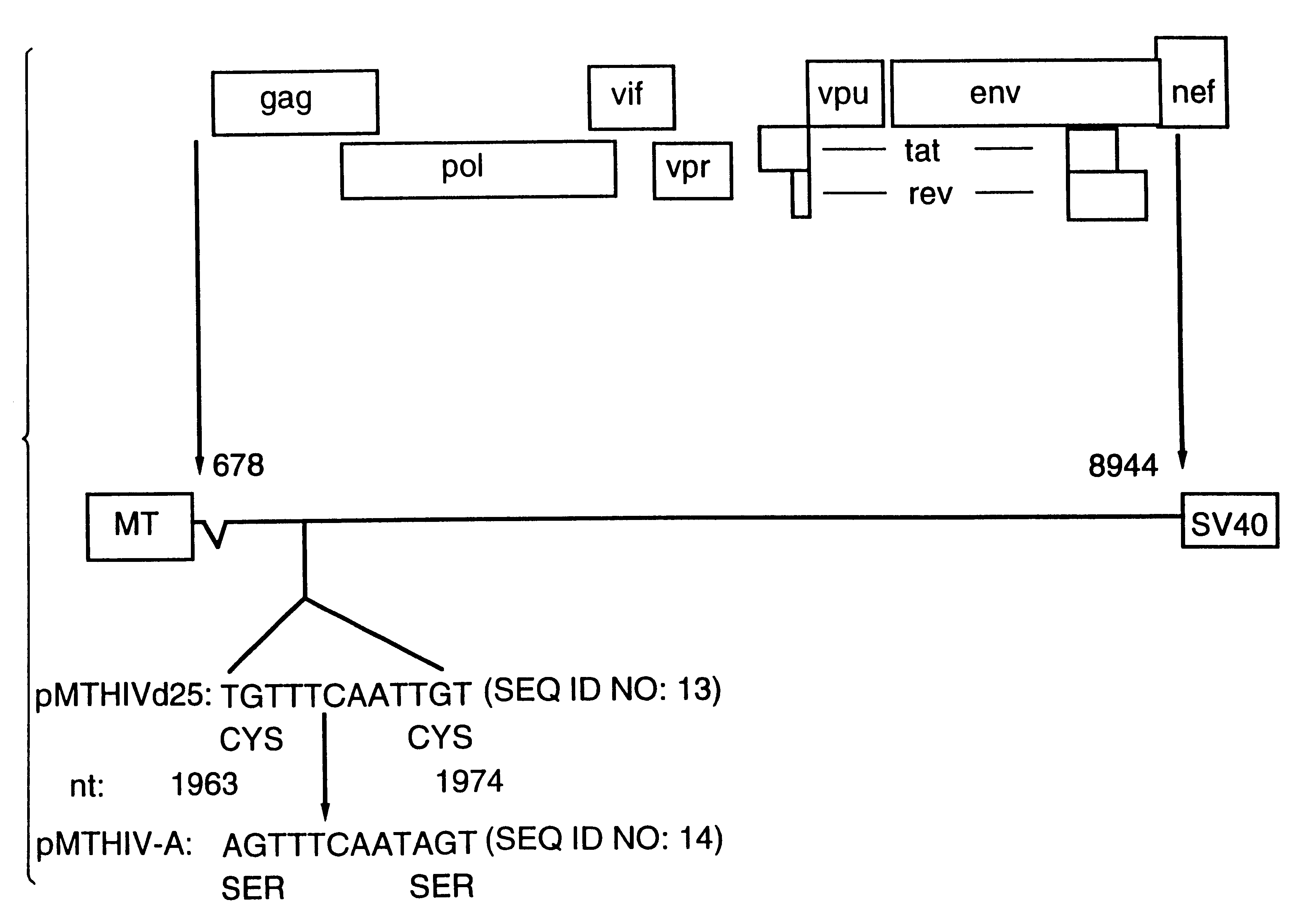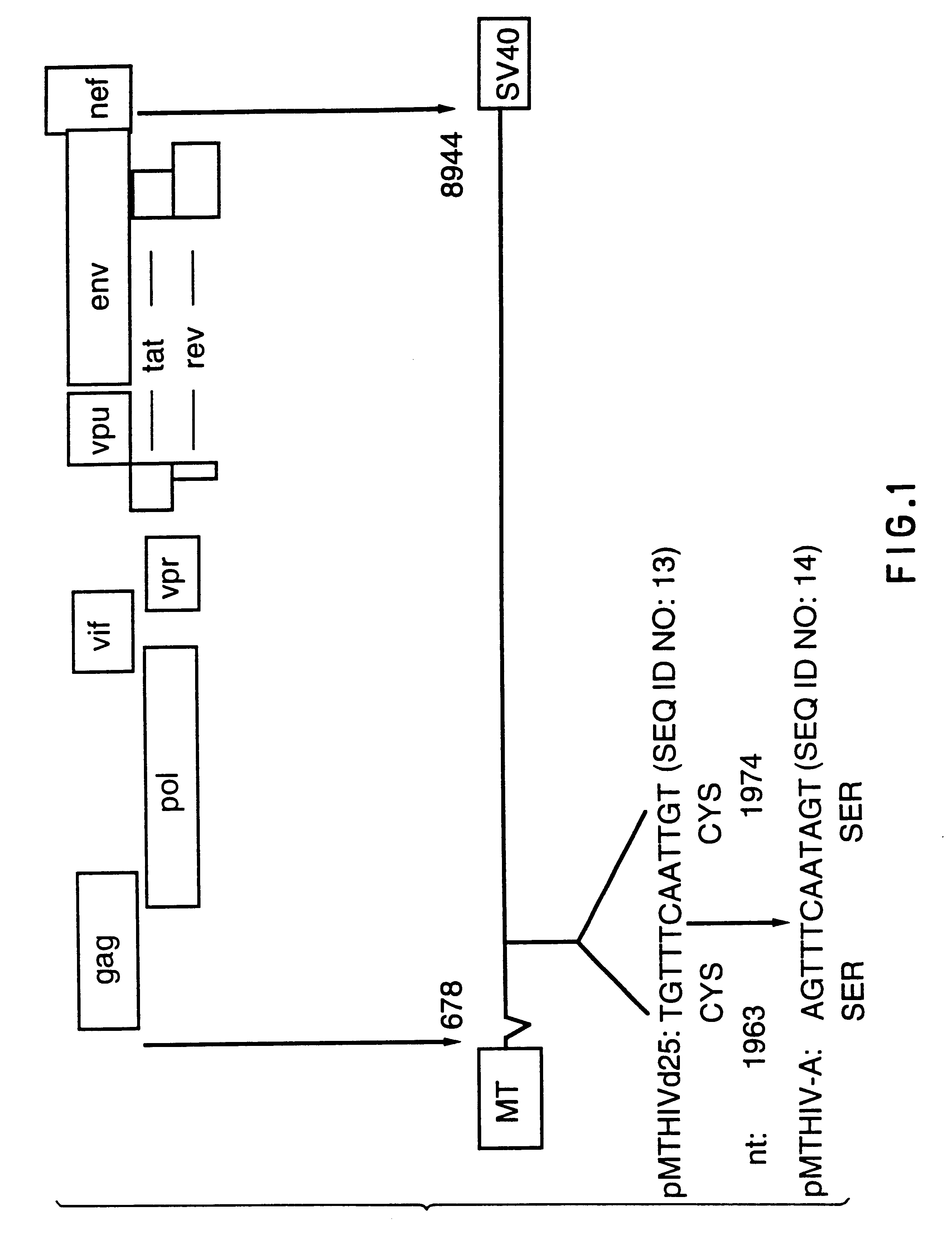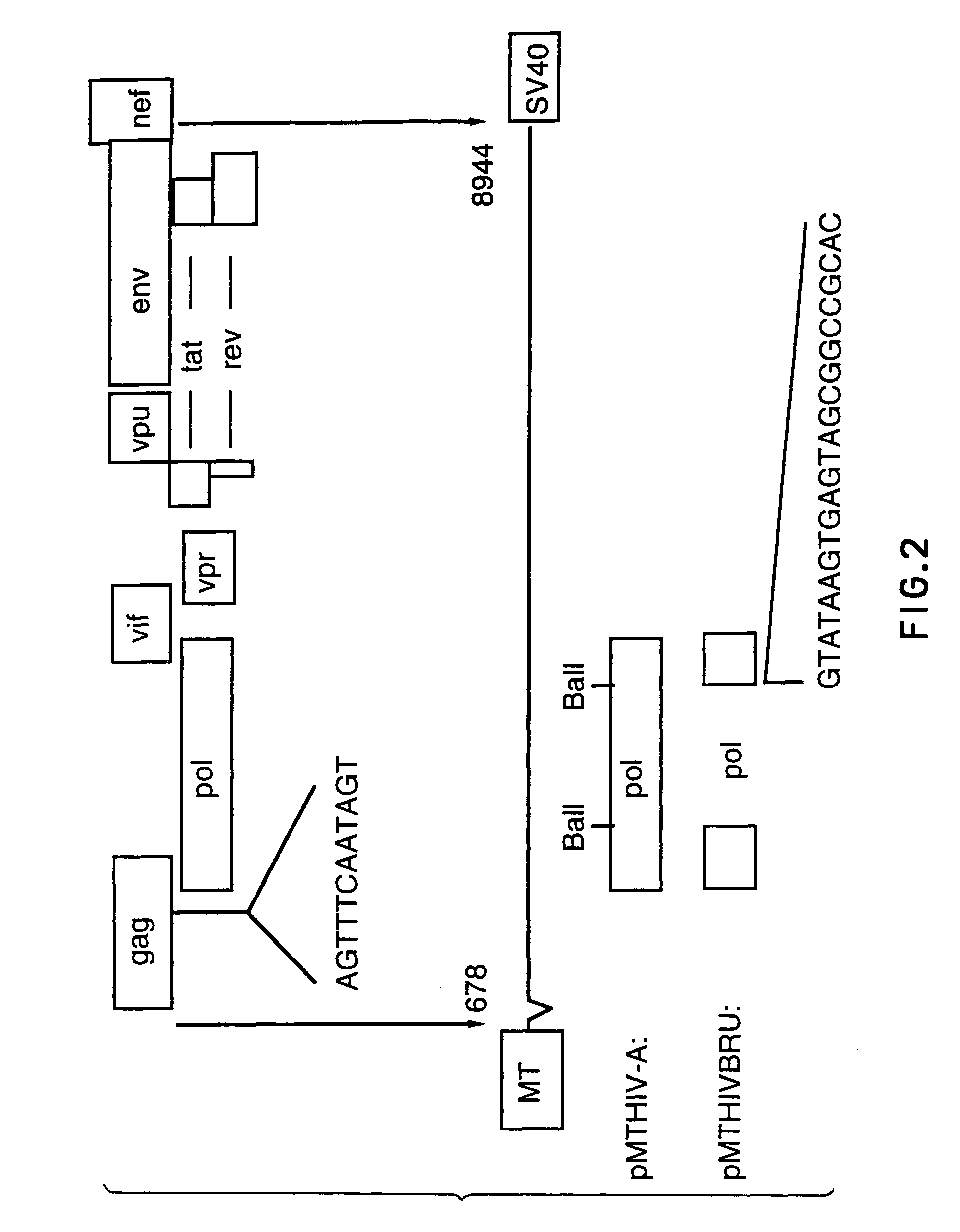Retrovirus like particles made non infectious by a plurality of mutations
a technology of retrovirus and like particles, applied in the direction of virus peptides, sugar derivatives, biochemistry apparatus and processes, etc., can solve the problems of no cure for disease, no vaccine, no effective treatment of aids, etc., and achieve the effect of enhancing the effectiveness of vaccines
- Summary
- Abstract
- Description
- Claims
- Application Information
AI Technical Summary
Benefits of technology
Problems solved by technology
Method used
Image
Examples
example 1
This Example describes the construction of plasmid pMTHIVBRU.
Plasmid pMTHIVBRU was constructed as shown in FIGS. 1 and 2. This plasmid is a modification of the expression vector pMTHIVd25 described in Rovinski et al 1992 (the literature references are identified at the end of the specification) and which contains an RNA packaging deletion, and was engineered to contain a series of mutations / deletions. Thus, a Cys-His box mutation included replacements of two cysteine codons (in SEQ ID NO: 13) with two serine codons in the first Cys-His box (SEQ ID NO: 14) of the gag protein as shown in FIG. 1. This was accomplished by a PCR-based mutagenesis method. Two primers were synthesized: the upstream primer having the sequence 5'-GGACTAGTACCCTTCAGGAACAAATAGGATGGATGACAAA TAATCCACCTATCCCAGTAGGAG-3' (SEQ ID NO: 15), comprising nucleotides 1,507 to 1,567 of HIV-1.sub.LAI, (all nucleotide numbering is according to Wain-Hobson et al., 1985) with a SpeI site at the 5'-end; and the downstream primer...
example 2
This Example describes the construction of plasmids encoding HIV-like particles containing antigenically marked envelope anchors.
Plasmid p83-19 was constructed from expression vector pMTHIVBRU, as shown in FIG. 3. This plasmid contains a hybrid envelope gene which was engineered by replacing DNA encoding most of gp120.sub.LAI, with the cognate DNA encoding gp120.sub.MN. This was accomplished by replacing a KpnI / BglII DNA fragment (nucleotides 6379 to 7668) from HIV-1.sub.LAI, with a KpnI / BglII DNA fragment (nucleotides 6358 to 7641) from HIV-1.sub.MN.
Plasmid pMTHIVHA2-701 was constructed from expression vectors pBT1 (Alizon et al, 1984) and pMTHIVd25 (Rovinski et al, 1992), as shown in FIGS. 4 to 6. The pMTHIVHA2-701 vector contains a 135-bp sequence comprising a coding DNA fragment and a stop codon from the human influenza virus HA2 gene (Min Jou et al, 1980), inserted between nucleotides 7777(G) and 7778(A) of the HIV-1.sub.LAI envelope gene (Wain-Hobson et al, 1985; Myers et al, ...
example 3
This Example describes the construction of plasmids encoding HIV-like particles containing antigenic epitopes from TMV.
Plasmids pHIV-T1, pHIV-T2, pHIV-T3, and pHIV-T4 represent modified versions of the p83-19 construct in that they contain, respectively, either one, two, three, or four copies of a double-stranded oligonucleotide (FIGS. 9, 10 and 11) comprising at least one antigenic epitope (Westhof et al, 1984; Trifilleff et al, 1991) from TMV coat protein. The construction of these four vectors is illustrated in FIGS. 9 and 10. To engineer all constructs, plasmid pMTHIV-A (FIG. 1) was first digested with SacII and ApaI to isolate a 1,328-bp DNA fragment which was then subcloned into pBluescript (Stratagene). The recombinant plasmid was then digested with PstI which cleaves HIV-1.sub.LAI DNA at nucleotide 1,415 within the gag gene. Subsequently, either one, two, three, or four copies of the double-stranded oligonucleotide shown in FIG. 9 (coding strand: SEQ ID NO: 19, complementary...
PUM
| Property | Measurement | Unit |
|---|---|---|
| temperatures | aaaaa | aaaaa |
| temperatures | aaaaa | aaaaa |
| temperatures | aaaaa | aaaaa |
Abstract
Description
Claims
Application Information
 Login to View More
Login to View More - R&D
- Intellectual Property
- Life Sciences
- Materials
- Tech Scout
- Unparalleled Data Quality
- Higher Quality Content
- 60% Fewer Hallucinations
Browse by: Latest US Patents, China's latest patents, Technical Efficacy Thesaurus, Application Domain, Technology Topic, Popular Technical Reports.
© 2025 PatSnap. All rights reserved.Legal|Privacy policy|Modern Slavery Act Transparency Statement|Sitemap|About US| Contact US: help@patsnap.com



